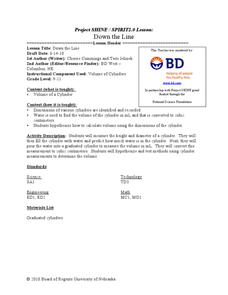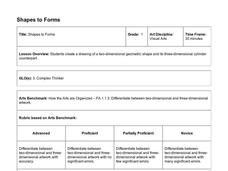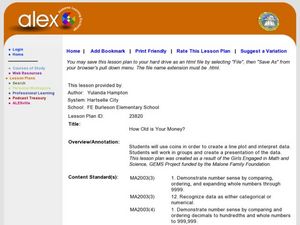Curated OER
Perimeter All Around
Students explore perimeter and area of regular and irregular polygons. They experiment with color squares and create different arrangements using the same number squares. Then they compare the area and perimeter measurements of each.
Curated OER
Geometry Shapes
Students create various geometric shapes with their younger grade "buddy partners." They identify and discuss various geometric shapes, and using gumdrops or marshmallows and toothpicks, construct different flat and three-dimensional...
Curated OER
Down The Line
Learnersinvestigate three-dimensional shapes. In this geometry lesson, pupils calculate the volume of cylinders using the given dimensions. They create a formula base don observation before using the real formula.
Curated OER
Shape Hunt
Young scholars photograph shapes around their school and create a shape movie. In this shape hunting lesson, students recognize shapes in a shape hunt. Young scholars can identify the shapes recorded by others in the class.
Curated OER
What a SHAPEly Fit!
Young scholars identify and explore the attributes of polygons. They design and create a quilt square using polygons, and produce a class quilt.
Curated OER
Water Treatment Plant Tour
Students define vocabulary related to geometry and calculate the volume. For this geometry lesson, students calculate flow rates, and volume as it relates to a water plant facility. They calculate the volume of three dimensional shapes...
Curated OER
Shapes (Geometric)
Second graders explore geometric shapes. In this lesson plan about geometry, 2nd graders create their own vest using geometric shapes. Students work with a partner and fit their partner for the vest they design. Students understand...
Curated OER
Compare 2-D Shapes
Second graders explore and analyze plane shapes. In this plane shapes lesson plan, 2nd graders evaluate shape attributes to classify shapes correctly. Students work in groups to create different shapes.
Curated OER
Ship Shape
Second graders explore shapes. After reading books about shapes, 2nd graders describe the properties of various shapes. They identify shapes if they have been rotated, flipped, or slid. Students create shapes using drawings and geoboards.
Curated OER
Shapes to Forms
Here is a math lesson that is really a visual arts lesson in disguise! In it, pupils utilize their knowledge of geometric shapes and forms to create a detailed version of a cylinder. The instructions on how to go about the task are very...
National Gallery of Canada
Memories of the Past
Explore contemporary American Indian art. After viewing a set of images, class members discuss the design elements of techniques present, as well as how these artists represent history and culture. Learners examine the parfleche and...
Curated OER
Using Concept Maps to Design 3D Spheres
High schoolers create three dimensional shapes using concept maps. In this geometry lesson, students investigate the impact of mental schemas on humans. They collect data on this topic and plot their data on a coordinate plane.
Curated OER
Circle Art
Students investigate two and three dimensional shapes. In this geometry lesson plan, students write equations of circles and graph them correctly. They create pictures using circles.
Curated OER
Make a Box
Students use specific dimensions to create a box. In this geometry lesson, students analyze the different properties of two and three dimensional shapes. They make conjectures and use it to solve problems.
Curated OER
Connecting With Coordinates
Play a coordinates game to encourage collaborative learning and grid use! Learners plot points on grids and play a game that challenges them to locate a specific point on a coordinate grid by using horizontal and vertical movements.
National Gallery of Canada
My Abstraction
What makes a color warm, and what makes a color cool? Explore colors and abstract art through an observation activity and an art assignment. Learners look at images and talk about colors before making their own compositions with...
DiscoverE
LIDAR: Mapping with Lasers
We would be lost without maps! How are they made? Introduce junior topographers to LIDAR technology with a fascinating activity. Set up a mock city, then have learners operate a laser measure to determine the shape of the landscape using...
Curated OER
Flexible "Glass" Sculpture
Older artists create 2-dimensional surfaces with paint, then use these paintings as the components of a 3-dimensional sculpture. They assemble a free-standing sculpture that may be viewed from any angle by using wire to create the shape....
Alabama Learning Exchange
How Old is Your Money?
Elementary learners explore coin mint dates. First, they listen to the book Alexander Who Used to be Rich Last Sunday by Judith Viorst. They then sort a collection of coins according to their mint date and put them in order from oldest...
American Institute of Physics
African American Inventors in History
A two-part lesson introduces young historians to the work of famous African American inventors. Groups first research and develop a presentation of an inventor that includes biographical information and information about one of their...
Curated OER
Volume of Solids: Algebra/Geometry Institute
Use this volume of solids lesson to have learners find the surface area and volume of cylinders, pyramids, and prisms. They place cubes inside three-dimensional figures to determine the volume. Worksheets and answers are provided.
California Academy of Science
Fish Forms
I've said it before, and I'll say it again, you can add art to any lesson! While little learners are discovering why fish have specific body parts such as, scales, fins, and gills, they start making three-dimensional fish forms. Children...
Teach Engineering
Circuits and Magnetic Fields
Have your class use compasses to try to find the magnetic field around an electric current. Groups use the same technique to visualize magnetic fields as they did in the second activity in the series, but this time, the field is created...

























